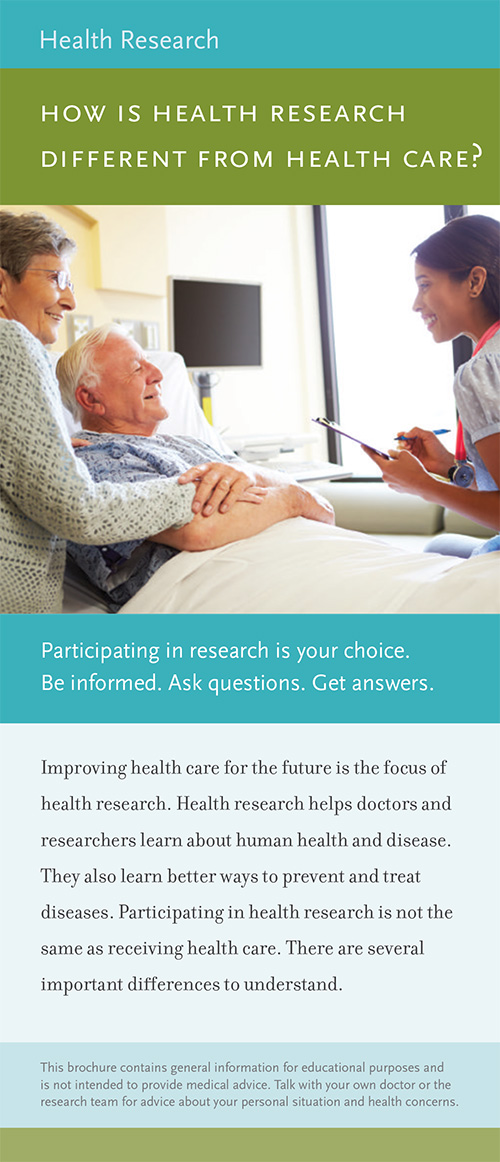How is health research different from health care?

Participating in research is your choice. Be informed. Ask questions. Get answers.


Improving health care for the future is the focus of health research. Health research helps doctors and researchers learn about human health and disease. They also learn better ways to prevent and treat diseases. Participating in health research is not the same as receiving health care. There are several important differences to understand.
Participating in research is a choice
Joining a research study is an important personal decision. Before you join, researchers will talk with you about the goals of the study, and possible risks and benefits. They will also explain the rules they follow to protect your safety and privacy. Ask for help if you don't understand something or have questions.
You should never feel rushed or pressured to make a decision. Being part of a research study is completely voluntary - it's your choice.
After you understand the study, you can agree to take part by signing a document called an "informed consent form." You can change your mind at any time, for any reason, even after you sign.
The risks and benefits of research studies
Research studies try to answer questions that have not been previously asked. Because the answers are unknown, there may be some risk. An experimental drug, device, treatment, or procedure might not be better than the drug, device, treatment, or procedure used currently in health care. The study might also cause side effects that researchers do not know much about.
Also, researchers hope to help people in the future. So you might not get any direct benefit from joining a study. Before agreeing to be in a research study, you need to understand the possible risks and benefits.
What is health care?
Keeping you healthy is the focus of health care, also called medical care. When you visit your health care provider, such as a doctor, dentist, nurse, nutritionist, physical therapist, or other health care professional for your personal health needs, you are receiving health care. Your health care provider listens to your concerns. He or she does tests to find the cause of your condition and treat your illness or disease. Your health care provider shares your test results with you and helps you understand what they mean. You talk about your options, and your provider helps you decide on treatment. When you receive health care, you are called a "patient."
What is health research?
Improving health care for the future is the focus of health research, also called medical research or clinical research. Health research helps doctors and researchers learn about human health and disease. They also learn better ways to prevent and treat diseases. If you choose to join a research study, you might help other people in the future. But the study does not necessarily help you with your current health needs.
When you join a research study, you may be called a "research participant," "research or study subject," or "research volunteer." You and other study participants help researchers by testing new or experimental drugs, treatments, and procedures. You are an important part of health research. Researchers could not develop new ways to prevent, learn about, or treat diseases and conditions without your help and participation.
What is a health research study?
A research study is a group of activities that are done to answer a specific scientific question. All studies must follow a detailed plan. The plan says who can be in the study and what will happen. This plan is called a "protocol."
When a study involves people, a group of experts called an "institutional review board," also called an IRB, learns about the study before it starts. They make sure the study is fair and as safe as possible for you to take part in the research study.
When you join a health research study, you help researchers learn whether the study drug, device, treatment, or procedure is safe, effective, and better than what is available now. You might have the disease or condition being studied or you might be healthy. In some studies, you do not know which treatment or procedure you will get. Sometimes, researchers do not know either. Studies are done this way to help answer the scientific question being asked.
You might learn the results of tests done in your study, or you might not. Researchers will work to protect your study information. They will also work to make sure only people who should see your personal and medical information can see it. After a study ends, researchers may share the results in a medical journal or news article. But they will not share your personal information.
How is health research different from health care?
| Health Research | Health Care | |
|---|---|---|
| Why is it done? | To answer a specific question about a disease, condition, drug, device or procedure that affects health. | To help you with personal health care needs. |
| You are called... | A research participant, research subject, study subject, or research volunteer. | A patient. |
| Who benefits and when? | People in the future. You might benefit or you might not. | You; now. |
| How certain is the result? | Researchers do not know if what they are studying works better or worse than current treatments. | Health care providers offer treatments that have been tested. They are accepted as safe and effective. |
Why participate in a research study?
You might choose to participate in a research study for one or more of the reasons below.
- You want to help others
- You like to volunteer
- You want to help researchers develop new treatments and drugs
- You want to help others who have your medical condition
- The available treatments have not helped your condition
Questions to ask
You have a right to ask questions about a research study. Below is a list of questions you might want to ask before you agree to take part in a study.
- How are the procedures in this study different from the health care I receive for my personal needs?
- Why am I being recommended for this research study?
- What do researchers expect me to do in this study?
- Do I need any of the study drug/device/treatment/procedures as part of my health care? Or will they mainly help researchers answer a scientific question?
- Will the study, drug/device/treatment/procedure help me feel better? Will it cure my disease or condition?
- What are the potential risks and benefits of being in the study?
- Should I keep seeing my health care providers during the study?
- Will the study team have access to my health care records?
- Will the drug/device/treatment/procedure being studied be available to me after I complete the study?

This information can be downloaded as a pdf brochure available in multiple languages on the Harvard Catalyst website.
